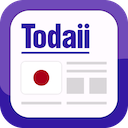Is Mastering Basic Japanese greetings really this easy?
Learn Japanese - Master Basic Greetings in Japanese Fast!
1477 viewIs Mastering Basic Japanese greetings really this easy?
Yep, you will learn a few tips to master basic Japanese greetings fast with this introduction lesson.
In this lesson, you are going to learn how to say hi, how are you in Japanese and how to answer.
It’s super easy and it only takes 3 minutes. Let’s learn a short dialogue.
So here is the typical conversation you hear every day in Japan.
こんにちは。 - "Hi" げんきですか。 - "How are you?" げんきです。 - "I am fine."
こんにちは。 - "Hi" or "hello". こ、ん、に、ち、は。
こんにちは. こんにちは is a general greeting meaning "hi" or "hello".
It also means "good afternoon" as one of the greetings for the day
But you can say こんにちは。All day long as a greeting when you meet people.
Next we have げんきですか。 - "How are you?". Let’s take a closer look.
げんきですか。 - "How are you?". げ、ん、き、で、す、か。
げんきですか。 げんき means "healthy", です is basically same meaning as "to be" in English, か is a sentence ending particle that can be used to make a question.
げんきですか。 literally means "are you healthy?" but it is used to mean "how are you?."
Now the easy part, answering the question. To answer the question げんきですか。 - "how are you?"
you just say げんきです。 - "I am fine."
You just have to drop the か(ka) at the end. げんきです。 - "I am fine."
げ、ん、き、で、す。 げんきです。
Let’s take a look at these two lines. Person A: げんきですか。 - "how are you?" Person B: げんきです。- "I am fine."
The only difference is, you drop the か when answering the question.
See this conversation. We are going to shorten it down. Ta-dah!
Here we have the same conversation げんき? - "How are you?" げんき。 - "I am fine."
The only difference is the intonation げんき? げんき。 - "I am fine."
Now be careful. This is a very informal conversation.
Don’t use it with your teachers or in business situations.
Now before you go, let’s look at two other responses to "how are you".
First we have.. まあまあ。 - "so so". さいあく。 - "Bad" or "I am not doing good at all".
So now let’s practice. So, I will ask you how you are and you respond.
こんにちは、げんきですか。
げんきです。 Good job! Now, you ask me how are you.
げんきです。 まあまあです。 さいあくです。 げんきですかー!
げんきがあれば、なんでもできる。 げんきですかー!
No word list

関東 蒸し暑く厳しい残暑 東京都心3日ぶり真夏日(2022年8月23日)

Learn Japanese - How Much Do Manners Matter in Japan?

震災から10年 イオンが東北の名産品を応援販売(2021年3月4日)

【速報】インドネシア地震 国家防災庁が死者は62人と発表 救助活動続く(2022年11月22日)

【年賀状】元日の配達に向けて 仕分け作業がピーク(2022年12月29日)

天皇誕生日の一般参賀も見送り 皇居内行事は検討中(2021年1月18日)

ホタテの貝殻から除菌ミスト ノンアルで手荒れ防止(2021年1月5日)

「暮らしと自然の復興プロジェクト」松川浦 新井章吾氏インタビュー(3/3)

ロシアの軍事技術が流れたか 北朝鮮外交官がミサイル部品調達に関与と指摘(2022年4月2日)

お盆休み 交通機関下りの混雑ピーク 高速は朝から激しい渋滞 東名などで31km(2023年8月11日)


You need to upgrade to a premium account to using this feature
Are you sure you want to test again?

Please upgrade your account to read unlimited newspapers


Todaii Japanese is a website for learning and reading Japanese news integrating various features such as dictionary, practice, testing, ...
https://todaiinews.com
todai.easylife@gmail.com
(+84) 865 924 966
315 Truong Chinh, Khuong Mai, Thanh Xuan, Hanoi


